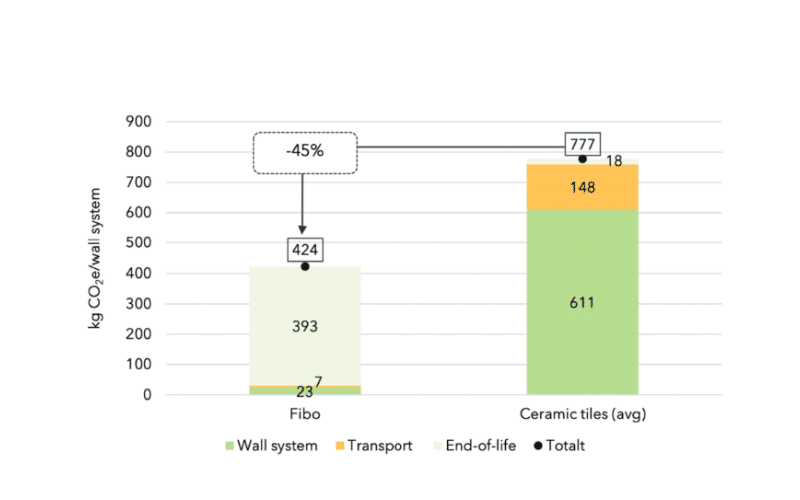
Get a copy of the climate report
A new independent study has revealed that Fibo’s leading waterproof wall system has a total carbon footprint that is up to 45% lower compared to tiles.
Fibo’s waterproof wall panels are not only beautiful but also easy to install, durable, and easy to maintain. They are also a more environmentally friendly choice for bathroom installations, which is becoming increasingly important in terms of sustainability and the drive to net zero. This environmental benefit was validated in a recent study by Asplan Viak, a renowned independent Norwegian building consultancy firm.
The study examined the climate impact of bathroom walls covered with Fibo’s waterproof wall panels and compared them to ceramic tiles. By considering the entire product life cycle and environmental declarations for both options, the study showed the climate impact throughout the value chain for both the panels and tiles. This includes material usage, material transportation, and material treatment when the bathroom is no longer in use (end of life cycle).
The study focused on a standard Norwegian bathroom, with a wall area measuring 11.5 square meters, to assess material usage. It found that using Fibo’s waterproof wall panels significantly reduces the amount of materials needed by 80%. This efficiency is largely attributed to Fibo’s unique “Aqualock” technology, which guarantees waterproofing upon proper installation. In contrast, traditional tiling methods necessitate an additional layer of membrane and plasterboards (or alternative waterproofing solutions), which not only increases material requirements but also adds to the overall weight.
CO₂ Emissions of a bathroom built with Fibo

Next, the study examined the climate impact of the products, considering the entire lifecycle of the products, including emissions at the end of their life. In this aspect, Fibo wall panels demonstrated a significantly lower environmental footprint, emitting 95% less CO₂ per installation compared to traditional tiles, under the assumption of panel reuse or recycling. This impressive reduction can be partly linked to the decreased material usage for panel installations and the nature of the materials themselves. Predominantly made of wood, Fibo’s panels utilize seven-layer plywood sourced from sustainably managed forests (PEFC certified), effectively capturing and storing carbon throughout the lifespan of the bathroom. Consequently, the carbon sequestered in the wood would only be released if the panels are not recycled or repurposed at the end of their life.
The report decisively indicates that Fibo’s waterproof wall panels have the potential to reduce the carbon footprint of a bathroom installation by up to 45% when compared to traditional tiling.
What implications does this have for you? It’s a significant advantage whether you’re a property developer, involved in social housing, a bathroom installer, or simply a consumer. Opting for Fibo wall panels, whether for new constructions or renovation endeavors, means you’re making a choice that’s kinder to the environment. You’re not only diminishing your carbon footprint but also actively contributing to environmental preservation.

How to access the report
For a copy of the climate analysis report please contact Sven Konrad, Export Sales Manager Europe / Asia Pacific.
